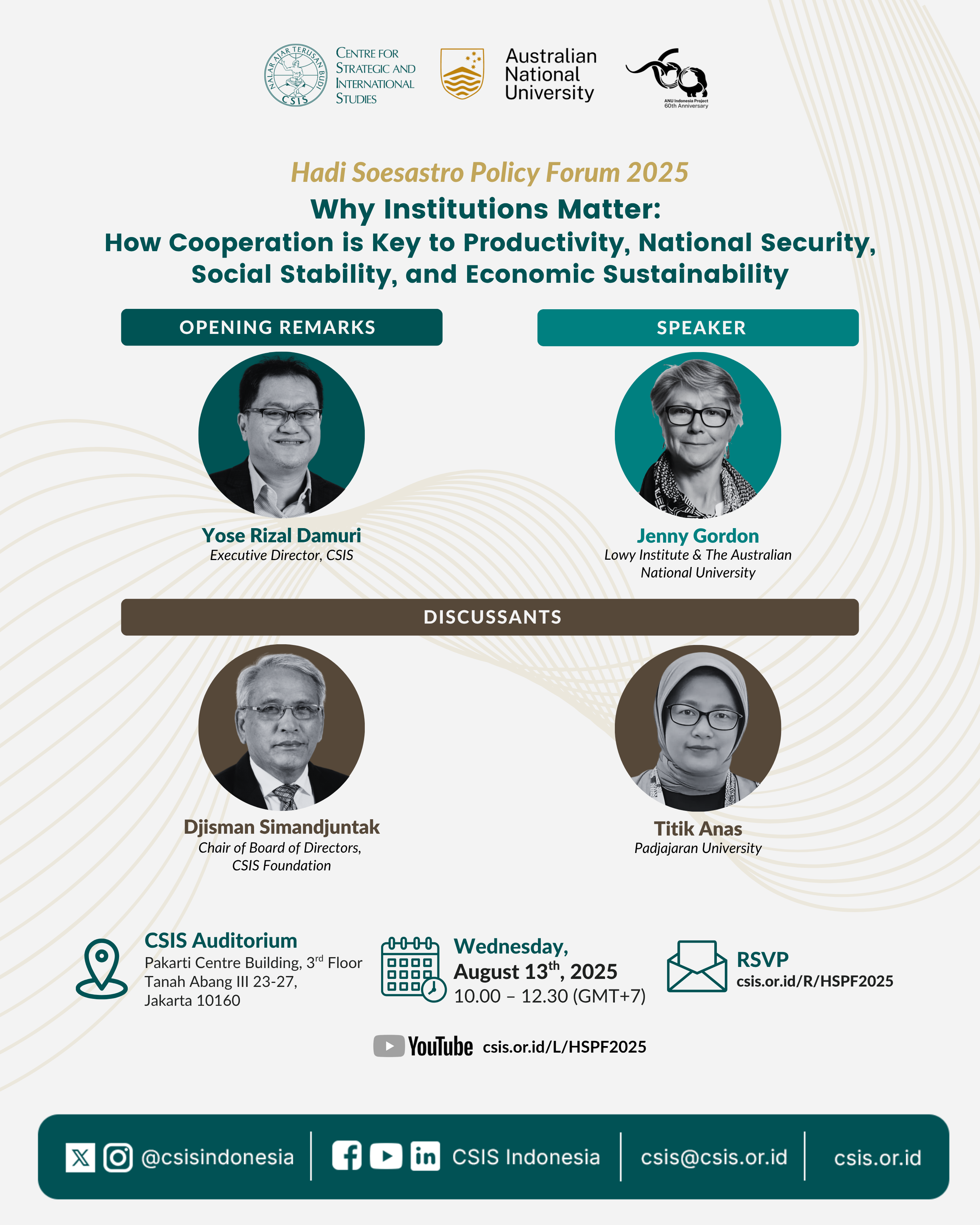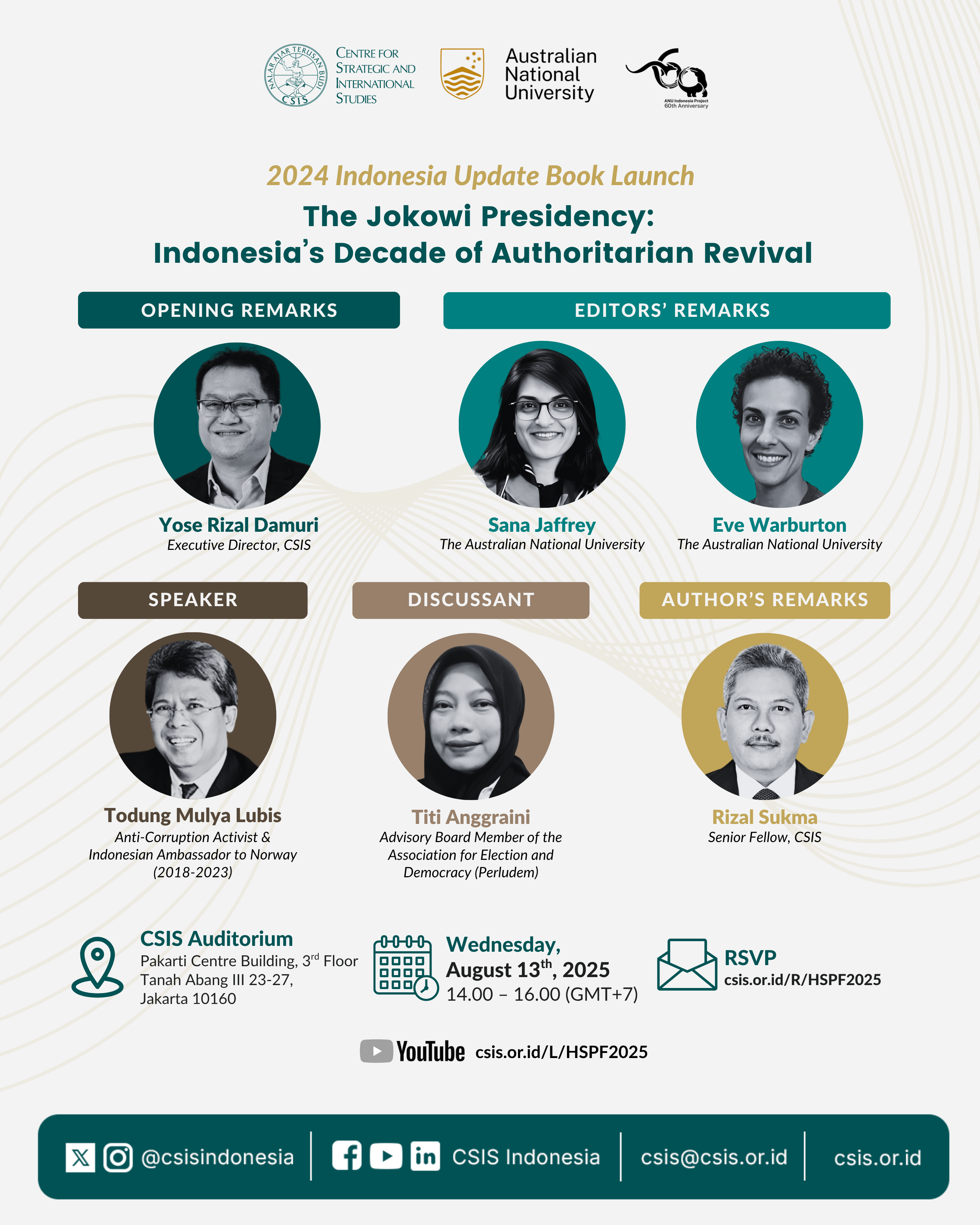Descriptions
Jakarta, CSIS Indonesia - Centre for Strategic and International Studies (CSIS Indonesia) held an online session to discuss "Rivers of Iron: Railroads and Chinese Power in Southeast Asia," with its authors, Prof. David M. Lampton, Dr. Selina Ho, and Dr. Kuik Cheng-Chwee, addressing the impact of China's infrastructure projects in Southeast Asian countries.
Since 2013, the People's Republic of China's Belt and Road Initiative (BRI) has grown rapidly to become one of the most important global development strategies. Its ambitious aim to connect China with countries in Asia, the Middle East, Europe, Africa, and even in America through the Maritime Silk Road and the Continental Silk Road has sparked major shifts in geopolitical and geoeconomics underpinning of these regions.
Under President Xi Jinping’s “New Era”, China's push for interconnectivity in Southeast Asia, through a railway system going through seven Southeast Asian countries, has been observed as part of its effort to reach global dominance. "Rivers of Iron: Railroads and Chinese Power in Southeast Asia” unveils the political strengths and weaknesses of this plan for a Southeast Asian railway system, including the historical context surrounding the railroad plan, the patterns and variety of responses in host countries across Southeast Asia - both accommodation and/or resistance, as well as the geopolitical and geoeconomic impact of the plan. The multi-disciplinary research book embarks to discuss on questions like “how the domestic politics of the Asian nations had influenced China’s ventures,” as well as on “how should the competing global powers respond to the plan.”
Dr. Rizal Sukma of CSIS Indonesia, acting as discussant to the book in the event, posited to the authors the much-discussed concern over whether China's BRI consists of a purely economic strategy or contains a certain strategic and political aspects in the country’s pursuit for hegemony and dominance.
Prof. David M. Lampton from the Johns Hopkins School of Advanced International Studies, stated that, although the Belt and Road Initiative did not begin as a strategically motivated program, it was quickly positioned to be a strategic character in time. “We need to think about interconnectivity in terms of the balance of economic power. Instead of focusing on opposing China, the country should focus more on diversifying connectivity so that there is a balance of ‘connectivity power’ in Asia,” said Prof. Lampton.
Dr. Selina Ho of the Lee Kuan Yew School of Public Policy, National University of Singapore, added that the BRI has given a structural strength to China in influencing the standards and agendas of countries in the world. She talked of how China, as a country of great power, would certainly want to dominate the surrounding region. Through the initiative, they were able to promote a vision in which Chinese civilization became the center of the world, similar to how the United States had dominated Latin America and the Caribbean with great influence.
Dr. Kuik Cheng-Chwee of the Centre for Asian Studies at the National University of Malaysia argued on how China was definitely not the first country, nor will it be the last, with desire to
expand its influence on the international stage. But many factors will determine whether China can translate its global ambitions into reality, since the BRI will depend on the role and consent of other countries involved.
The profound discussion on the book stimulates broad range of critical questions from the audiences. In general, most of the questions cover a key theme on how Xi’s connectivity initiatives adapt to the domestic and regional politics of the Southeast Asian states. The authors highlight the inevitable capricious geopolitical circumstances that requires China to always be in the learning curve. “I doubt there is a grand plan to execute every issue step by step, for every country. This is impossible. Things have changed and China has (indeed) been adapting and sometimes does (a mix of) concession (to adjust with the local politics),” argue Dr. Kuik Cheng-Chwee.
Another participant discussed a different perspective, on whether the BRI was, and still is, a project aimed to compensate China’s domestic weaknesses. The authors elaborate that the BRI has indeed acted to counterweigh China’s internal vulnerabilities, such as its energy insecurity. Regardless, it is also worth to notice that this infrastructure megaproject is part of the bigger pursuit for a great power status. “Actually, there is this motivation to become a maritime power. It is in part driven by this insecurity, but also about status. The status of great power,” Dr. Selina Ho asserts.
Finally, the dialogue concludes that despite the assertiveness of the Chinese government to push forward the initiatives, the seven host states to the railroad plan do have role and bargaining power to negotiate the deal, supported by factors such as size, wealth, location, as well as the state capacity.
For more information:
Centre for Strategic and International Studies (CSIS)
Jakarta, Indonesia
international.relations@csis.or.id
Event Details
book launch and discussion
Rivers of Iron: Railroads and Chinese Power in Southeast Asia
authored by
David M. Lampton, Selina Ho & Cheng-Chwee Kuik.
The book illuminates the political strengths and weaknesses of the China’s effort to create an intercountry railway system connecting China and its seven Southeast Asian neighbors (Cambodia, Laos, Malaysia, Myanmar, Singapore, Thailand, and Vietnam), as well as the capacity of the impacted countries to resist, shape, and even take advantage of China’s wide-reaching actions. Using frameworks from the fields of international relations and comparative politics, the authors of Rivers of Iron seek to explain how domestic politics in these eight Asian nations shaped their varying external responses and behaviors. The three authors will be presenting on-line their book, followed by series of discussion.
Moderator
Shafiah F. Muhibat
Senior Researcher (on leave)
Centre for Strategic and International Studies
Speakers
Dr. Kuik Cheng-Chwee
Head of Associate Professor
Centre for Asian Studies (IKAS), Institute of Malaysian and International Studies (IKMAS), and Natio
Dr. Selina Ho
Assistant Professor in International Affairs
Yew School of Public Policy, National University Singapore
Prof. David M. Lampton
Professor Emertus of China Studies
John Hopkins School of Advanced International Studies
Rizal Sukma
Senior Fellow
Centre for Strategic and International Studies














